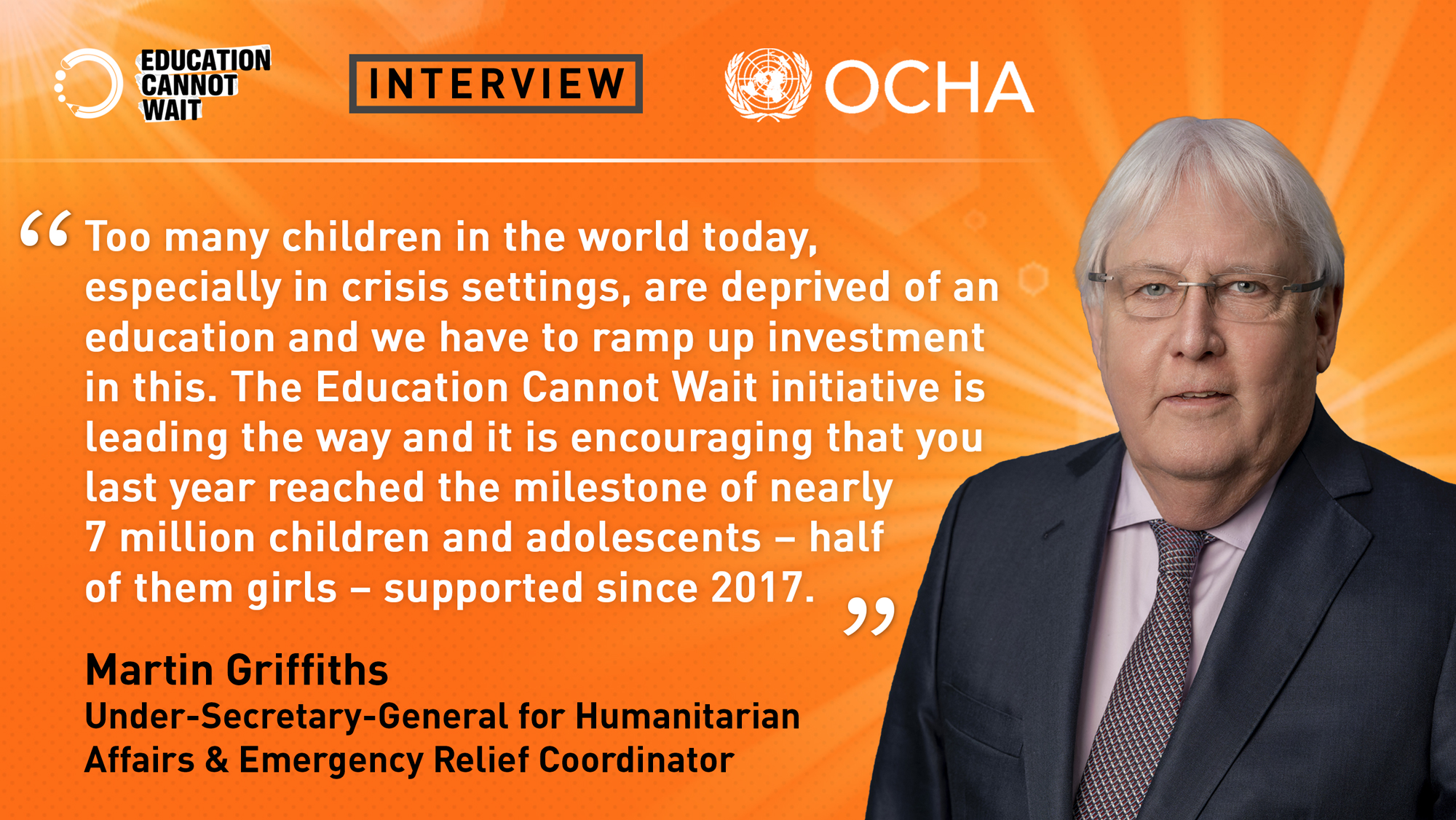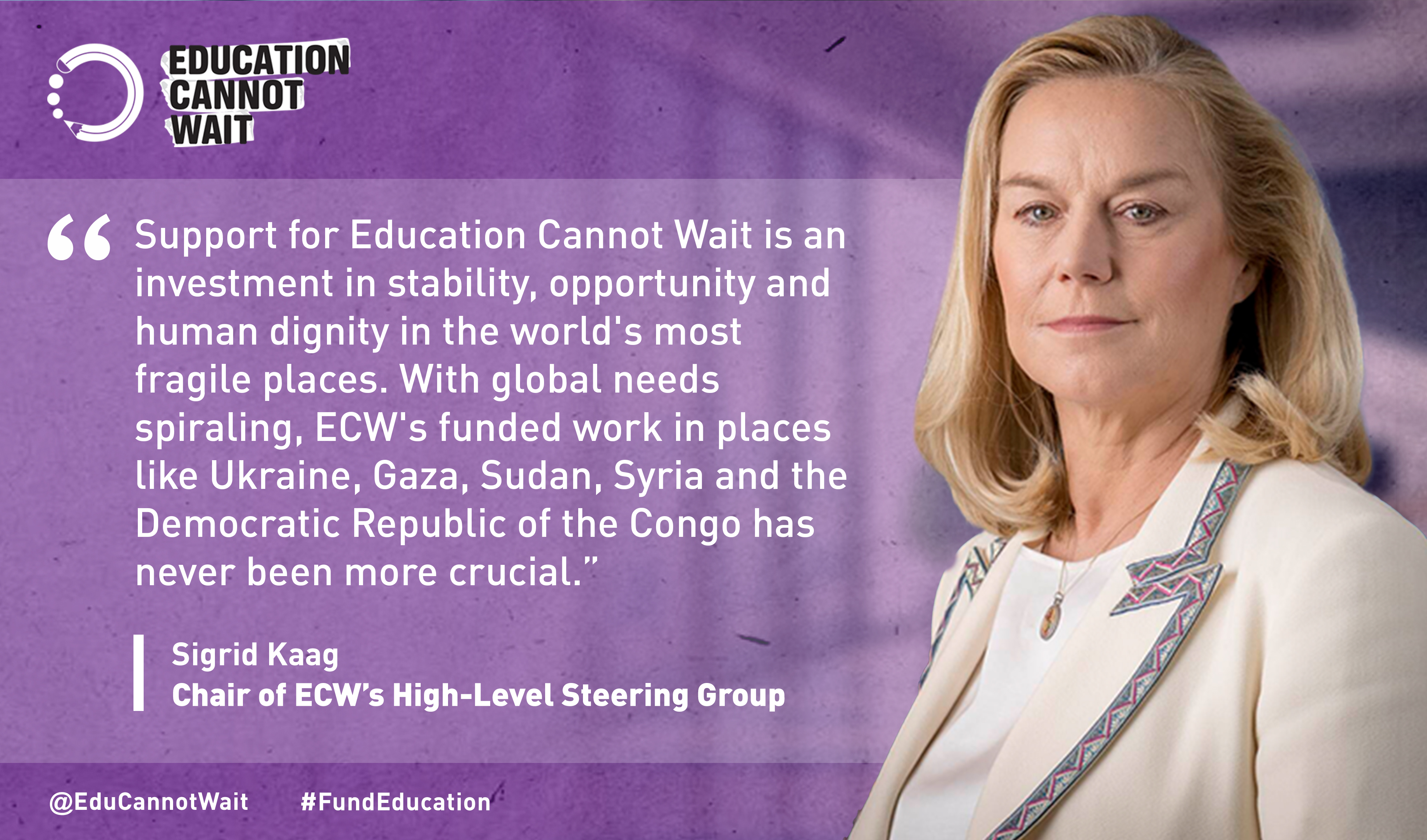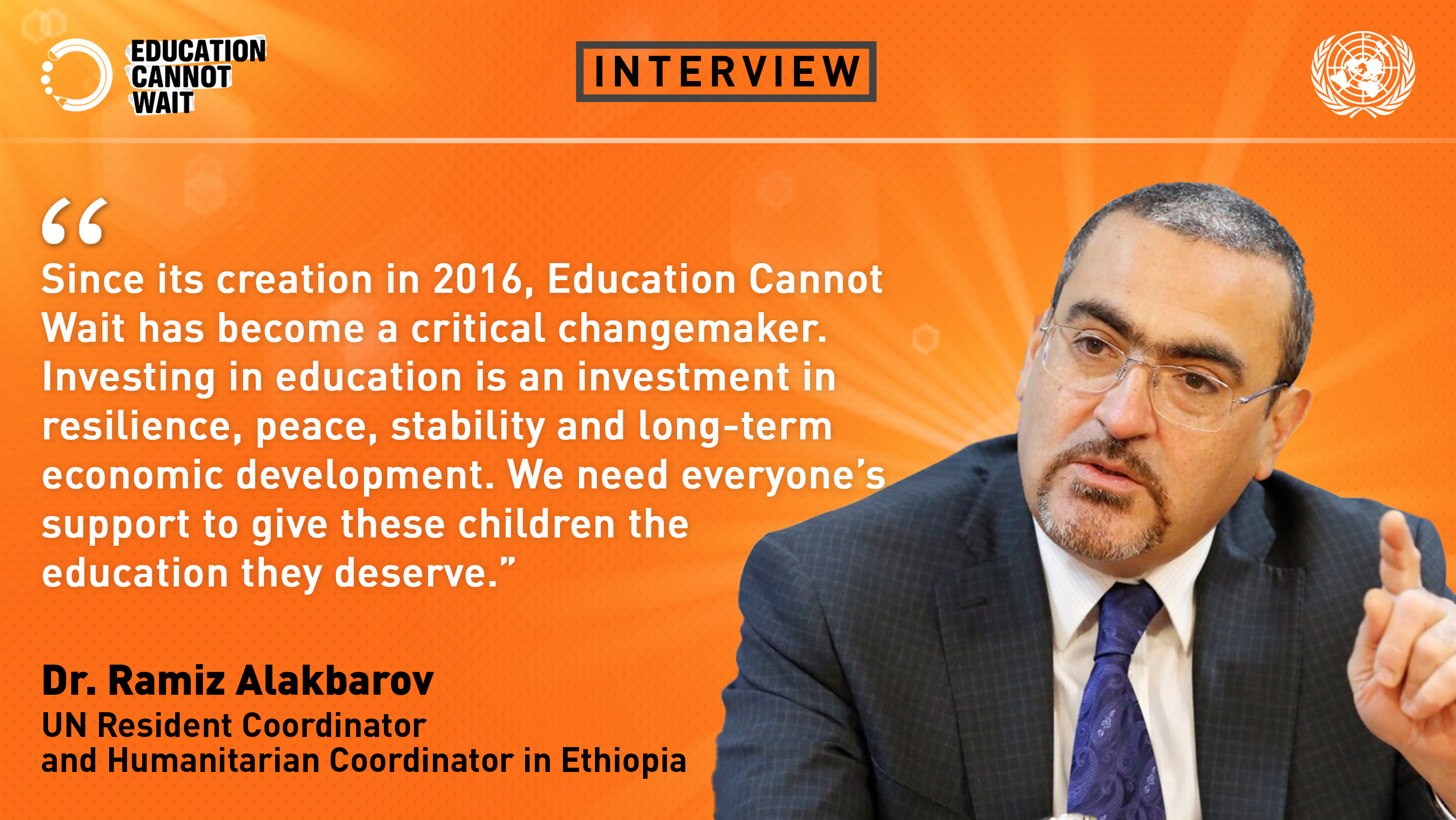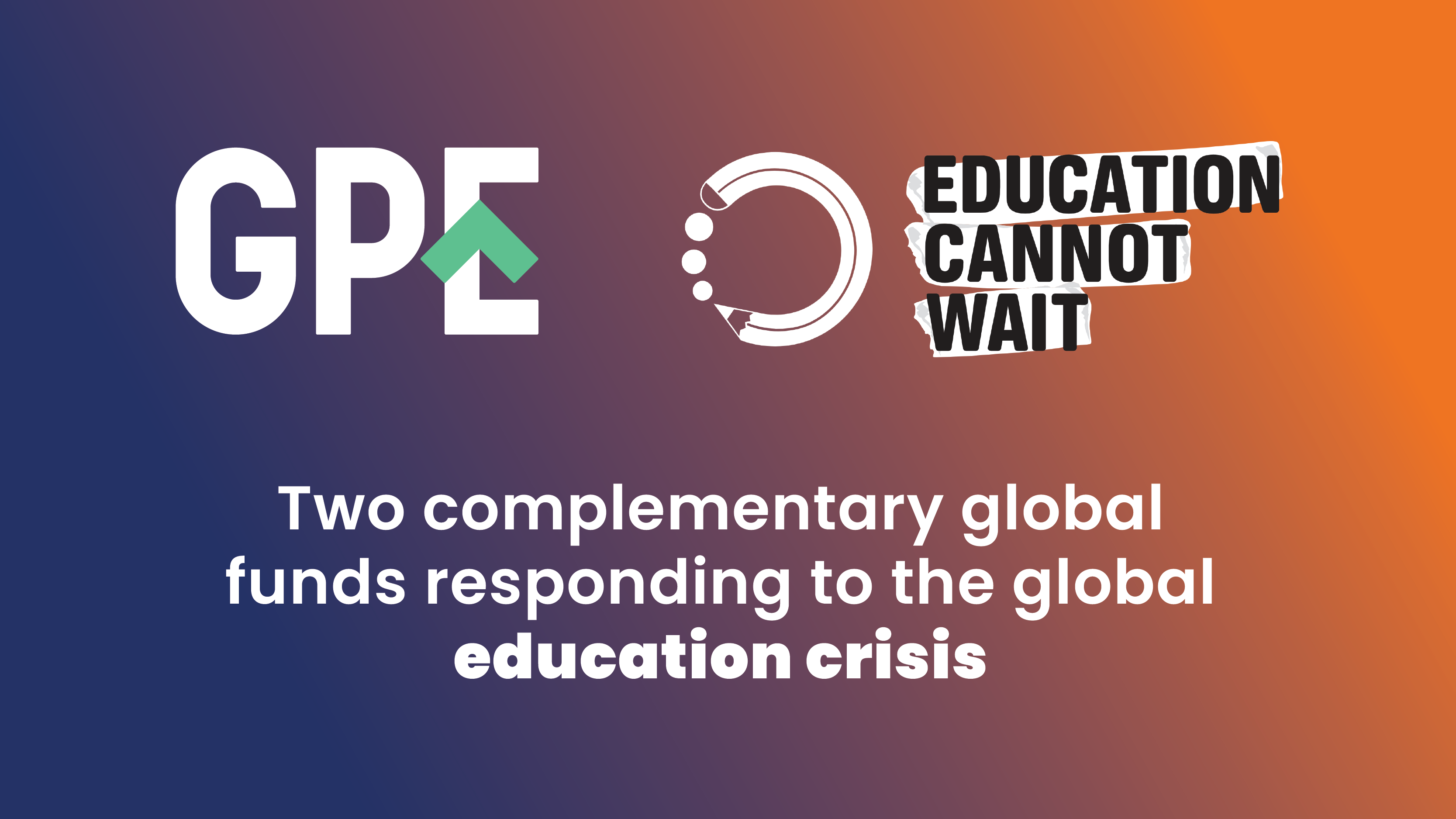Education Cannot Wait Interviews Martin Griffiths, Under-Secretary-General for Humanitarian Affairs and Emergency Relief Coordinator

United Nations Secretary‑General António Guterres appointed Martin Griffiths of the United Kingdom as Under-Secretary-General for Humanitarian Affairs and Emergency Relief Coordinator in May 2021.
Mr. Griffiths brings extensive experience in humanitarian affairs. Since 2018 he served as the Secretary-General’s Special Envoy for Yemen. Between 2014 and 2018, he served as the first Executive Director of the European Institute of Peace. Between 2012 and 2014, he served as an adviser to all three Special Envoys of the Secretary-General for Syria, and Deputy Head of the United Nations Supervision Mission in Syria (UNSMIS). From 1999 to 2010, Mr. Griffiths was the founding Director of the Centre for Humanitarian Dialogue in Geneva.
He also worked in the British diplomatic service and for various international humanitarian organizations, including UNICEF, Save the Children and Action Aid. In 1994 he became the Director of the Department of Humanitarian Affairs in Geneva and, from 1998 to 1999, served as Deputy to the United Nations Emergency Relief Coordinator in New York. He has also served as United Nations Regional Humanitarian Coordinator for the Great Lakes and in the Balkans.
Mr. Griffiths holds a master’s degree in Southeast Asian studies from the School of Oriental and African Studies at the University of London and is a qualified barrister.

ECW: The United Nations Office for the Coordination of Humanitarian Affairs (OCHA) has been a trusted partner since ECW’s establishment in 2016. As we look forward to ECW’s High-Level Financing Conference in February 2023 through the #222MillionDreams campaign, how can we best engage partners across the humanitarian-development-peace nexus and enhance coordinated actions?
Martin Griffiths: I am hard-pressed to think of anything more important than ensuring the education of our children. It is fundamental for the progress of society and our future well-being. When I speak with people in the crisis-affected countries where OCHA works, parents are always concerned for their children’s education, and children themselves yearn to go to school. Just think of the girls in Afghanistan who were left in tears outside the gates when the Taliban closed their schools.
Too many children in the world today, especially in crisis settings, are deprived of an education and we have to ramp up investment in this. The Education Cannot Wait initiative is leading the way and it is encouraging that you last year reached the milestone of nearly 7 million children and adolescents – half of them girls – supported since 2017.
COVID-19 lockdowns have taken a heavy toll on education globally, but even before the pandemic, 127 million school-age children and young people in crisis-affected countries were out of school. Despite many schools reopening in 2021, more than 870 million students still face disruptions to their education. If we are to meet Sustainable Development Goal 4 and give quality education to all, we need humanitarian, development, and peace partners to come together and approach the challenges together.
Progress has been made on this so-called nexus approach in the UN system, and among donors and other key stakeholders, and we are seeing better joined-up analysis and planning. But more needs to be done to align decisions in programming and financing with the agreed priorities, also in the education sector.
OCHA is the Co-Chair of the Joint Steering Committee to advance humanitarian and development collaboration in the UN and plays an active role in the Inter-Agency Standing Committee on the nexus approach. We are looking into how basic social services – including education – can best be delivered in crisis contexts.
ECW: According to Education Cannot Wait’s new Annual Results Report, while 2021 saw a record-high US$645 million in education appeal funding – the overall funding gap has spiked. How can we bridge that funding gap and bring new and non-traditional donors on board?
Martin Griffiths: In 2021, the education sector in our global humanitarian appeals was only 22.5%funded, well below the average. Currently, the education sector is about 20.5% funded.
The lion’s share of funding for the UN-coordinated humanitarian appeals, including the education sector, comes from a limited number of donors. We urge more countries and all donors to step up support to meet the ever-growing humanitarian needs.
Thanks to the OCHA-managed Country-Based Pooled Funds, we often step in and help fill some of the most urgent funding gaps. Last year, these pooled funds allocated nearly US$80 million to education in 20 countries.
Development actors should also invest more in education in crises and make full use of new and innovative technology. They could also engage closer with private sector partners. We need everybody to help safeguard children’s right to education and leave no one behind.

ECW: You served as the UN Secretary General’s Special Envoy for Yemen from 2018-2021. How can education for children and adolescents caught in protracted crises – in places like Yemen, Syria, and beyond – support our efforts to build peace and achieve the goals outlined in the 2030 Agenda for Sustainable Development?
Martin Griffiths: Speaking of peacebuilding in countries like Syria or Yemen can be difficult. However, delivering education services that are sensitive to the divisions within societies and the underlying drivers of the conflicts is a good start to overcoming deep-rooted social and political cleavages – or at least promoting a sense of inclusion.
Education is of course literacy and numeracy, but it is also life skills such as problem-solving, conflict resolution, and community building. All these skills are important in for example Syria and Yemen where young people make up around one third of the population. Many have been out of school for years to support their families, join the fighting, some get married early, and so on. Education will offer these children opportunities to feel included, form positive social relationships, and to be empowered in their communities.

ECW: The COVID-19 pandemic has deepened the global learning crisis. In 2020 and 2021, 147 million children missed over half of in-person instruction and as many as 24 million learners may never return to school. What needs to be done collectively so we can build back better?
Martin Griffiths: Prolonged school closures have disproportionately impacted children in low-income households. This leaves them at risk of fewer employment opportunities and reduced lifetime earnings. In the recovery phase after the pandemic, we must ensure all children have access to education, including catch-up learning programmes for foundational skills, especially for children in low-income households.
Girls have faced additional barriers during the pandemic, and we saw more early marriages, pregnancies, and gender-based violence, things that can keep girls out of education. Many girls who left school may not return. Recovery efforts must support girls’ access to education and training. We should also focus on interrelated issues such as girls’ health and protection.
The pandemic revealed the importance of equitable digital access. There is an opportunity now to further invest in digital tools and infrastructure so all children can take advantage of digital learning.
ECW: The LEGO Foundation is ECW’s largest private sector donor, with approximately US$40 million in contributions to date. Why is investment in education by the private sector – especially early childhood education – important not only from a rights perspective but for business and economic stability worldwide?
Martin Griffiths: In their earliest years, children form more than 1 million new brain connections every second – an astounding pace that is not repeated at any other phase of life. Early Childhood Development (ECD) holds an incredible promise to transform the lives of children around the world.
Through quality education in the earliest years, we can set children on a path that will have lifelong benefits for their learning and earning potential. Quality early education is one of the best investments we can make to transform societies and support a more skilled workforce. We face a large challenge to ensure all children have access to universal pre-primary education by 2030. I encourage the private sector to invest heavily in this.

ECW: Our readers would like to know a little about you on a personal level and we know that readers are leaders. What are some of the books that have most influenced you, personally and professionally, and why would you recommend them to others?
Martin Griffiths: I am reading a biography of former SG Dag Hammarskjöld, one which draws heavily on Markings, his journal and record of his values. I have also been reading accounts of the early years of independence in Malaysia and Singapore, the home base of my wife and children. I have been rereading accounts of the US administration of Iraq, including Fiasco by Thomas E Ricks. Hilary Mantel’s A Place of Greater Safety remains one of the best books I have ever read. It takes us living and breathing into the extraordinary events of the ‘Terror’ in France in the French Revolution, giving us the human picture even of people like Robespierre and Desmoulins. And for light reading, I have just taken delivery of the latest Robert Harris novel, Act of Oblivion, a historical novel set in the seventeenth century.



